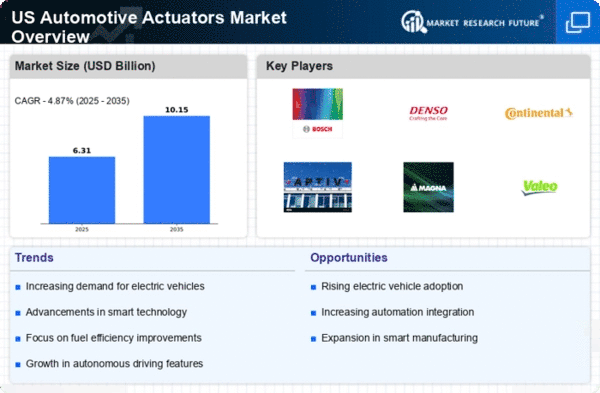Regulatory Push for Safety Standards
The automotive actuators market is also shaped by a regulatory push for enhanced safety standards in vehicles. Governments are increasingly mandating the incorporation of advanced safety features, which often rely on sophisticated actuator systems. For example, regulations surrounding electronic stability control and anti-lock braking systems necessitate the use of high-performance actuators to ensure optimal vehicle safety. This regulatory environment is likely to propel the market forward, as manufacturers strive to comply with stringent safety requirements. The automotive actuators market is projected to benefit from this trend, with an anticipated growth rate of around 6% annually as safety regulations become more rigorous.
Growing Demand for Vehicle Automation
The automotive actuators market is significantly influenced by the growing demand for vehicle automation. As consumers increasingly seek vehicles equipped with automated features, the need for reliable and efficient actuators becomes paramount. This trend is particularly pronounced in the development of autonomous vehicles, where actuators play a critical role in steering, braking, and acceleration systems. According to industry estimates, the market for automotive actuators is expected to reach $30 billion by 2026, driven by the proliferation of automated driving technologies. Consequently, manufacturers are investing heavily in actuator technologies to meet the evolving needs of the automotive industry.
Technological Advancements in Actuator Design
The automotive actuators market is experiencing a surge due to rapid technological advancements in actuator design. Innovations such as miniaturization and enhanced performance capabilities are driving manufacturers to develop more efficient actuators. For instance, the integration of smart materials and advanced control algorithms is enabling actuators to operate with greater precision and responsiveness. This trend is particularly evident in applications such as electronic throttle control and power window systems, where improved actuator performance can lead to enhanced vehicle functionality. As a result, the market is projected to grow at a CAGR of approximately 7% over the next five years, reflecting the increasing demand for sophisticated actuator solutions in the automotive sector.
Rising Consumer Preference for Comfort Features
The automotive actuators market is positively impacted by the rising consumer preference for comfort features in vehicles. Modern consumers increasingly prioritize amenities such as power-adjustable seats, automatic climate control, and advanced infotainment systems, all of which rely on actuators for functionality. This shift in consumer expectations is prompting manufacturers to enhance actuator designs to provide smoother and more reliable operation. As a result, the market is expected to witness substantial growth, with projections indicating a potential increase in market size by 20% over the next five years. This trend underscores the importance of actuators in delivering a superior driving experience.
Expansion of Electric and Hybrid Vehicle Segments
The automotive actuators market is experiencing growth due to the expansion of electric and hybrid vehicle segments. As these vehicles become more prevalent, the demand for specialized actuators that cater to their unique requirements is increasing. Electric vehicles, for instance, utilize actuators for functions such as battery management and regenerative braking systems. The market for automotive actuators is projected to grow by approximately 8% annually, driven by the increasing adoption of electric and hybrid technologies. This trend highlights the need for manufacturers to innovate and adapt actuator solutions to meet the specific demands of these emerging vehicle types.
















